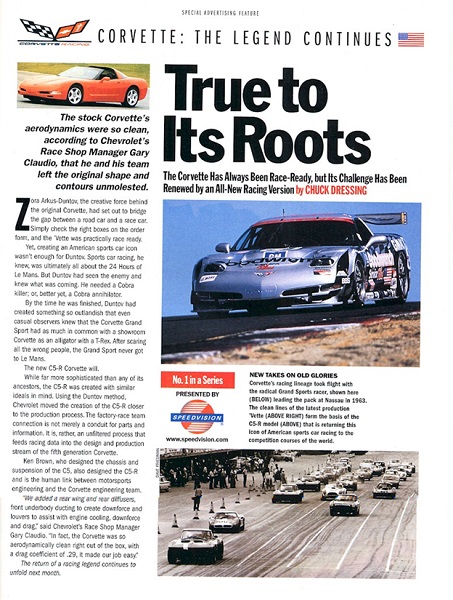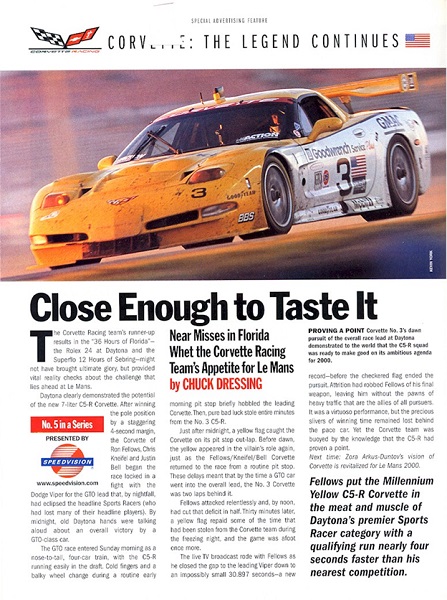Corvette History through Ads: The C5R and Factory Racing, Part 2
Fifth generation Corvette sales were as successful as the factory backed Corvette Racing Team. The team raced in the American LeMans Series, a highly competitive venue that placed the Corvettes in competition with Ferraris, Vipers, Aston Martins and Porsches, with the objective of reestablishing the Corvette as the world’s preeminent performance car. After an absence of more than three decades from factory backed racing the return was hailed from Corvette enthusiasts both inside and outside the company.
After more than a year of modifying and testing, the C5-R was ready and in 1999 the team, under the leadership of Doug Fehan and stocked with a talented group of drivers, got off to a flying start. In the five races entered that season, Corvette racing was on the podium three times.
During the expanded 2000 racing season, loyal Corvette Racing fans watched the team win two of the eight races and finish on the podium another five times securing the GT championship. In 2001, the team won eight of ten races and again took the championship. The next season the C5R won ten of eleven races and actually took the number one and two spots in eight of the eleven races. In 2003 the team slipped slightly, winning half of the ten races but still winning their fourth championship. Then in 2004, the final year of competition for the C5R, the team came back with a vengeance and captured every pole position and won every race of the season, ten of ten. Additionally, the team finished one and two in eight of the races, a record that has never been beaten. The C5R team was the most successful in history and gave the marketing department all the ammunition they needed to help sell the Corvette and establish it as the most dominant performance production car of its time.
Since the program’s beginning, Chevy’s marketing department has been quick to capitalize on the on-track success. But wins aren’t the only thing that lured enthusiasts into showrooms. The C5 was simply a magnificent sports car from a design and engineering standpoint. The racing victories not only helped the Corvette gain a new respect from enthusiasts but from professionals and knowledgeable members of the press. Magazines praised the C5 and the Society of Automotive Engineers designated the 1999 C5 as the best engineered car of the twentieth century. With the added benefit of the racing victories, the marketing department had a lot to work with. And the old adage, “Win on Sunday. Sell on Monday,” proved to be more fact than fiction. Sales of the fifth gen Corvette averaged fifty percent more than the fourth generation models the first full year of production and continued climbing from there. By the end of the model run sales were topping 35K cars, seventy five percent ahead of the C4.
One of the major objectives of the racing team was to capture the prize of sports car racing, the 24 Hours of Le Mans. It was the dream of Zora Arkus-Duntov and inspired him to build the Grand Sport, which he never got to race due to GM’s 1963 official ban on racing. Forty years later, Fehan and the C5R Team were still focused on that goal. Both the team and the marketing department were so convinced that the team would participate in the historic race, a monthly advertising installment began at the beginning of the racing season detailing the team’s focus and progress in attaining that lofty goal. The six ads, written as short articles by Chuck Dressing, briefly addressed the car’s development, the development of the LS7 racing engine, and the two major races leading up to Le Mans, the 24 Hours of Daytona and the 12 Hours of Sebring. The articles detailed successes as well as disappointments. In the fifth and final installment just before the actual race, it explained the team was so committed to winning Le Mans, they did not participate in ALMS races between Sebring (which took place in March and the July running of Le Mans) in order to spend time preparing for the crown jewel of sports car racing. Fehan was quoted in the advertisement, “We’re not focused on winning a championship, any championship. Our goal is to win Le Mans, and history shows us that can take a long time.” History however proved Fehan wrong. Though the team did not win their class in the 2000 race, they finished first and second the following year.





